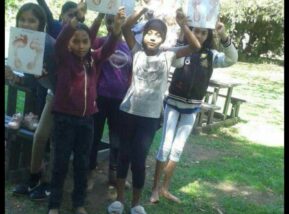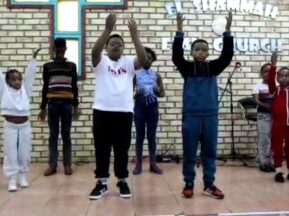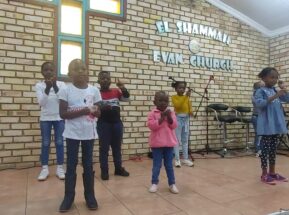
WELCOME TO THE ECSA
CHILDREN’S
MINISTRY
INTRODUCTION
Children’s Ministry is a key component in the growth stages of development for every child walking through the doors of our churches. From babies and toddlers until they reach youth ministry, there is an amazing opportunity to show Gods love, grace and redemption in tangible ways through children’s ministry.
THE CHILDREN’S MINISTRY
OF THE E.C.S.A.
VISION STATEMENT:
The ECSA Children’s Ministry is a powerful tool in the local church. Under its organization, the children’s ministry strives to:
- ·CONNECT children to God and each other
- ·EQUIP and TRAIN children with the word of God and help them to
- ·GROW in their faith and to challenge their growth through,
- ·SERVING Christ, others and the church
- ·REACHING children in the community, locally and globally with God’s Love.
STRATEGIC PLANNING FOR
THE CHILDREN’S MINISTRY
Many adult Christians have a heart for children yet lack a carefully considered biblically informed strategy for connecting children to Jesus and his story. Benjamin Franklin has supposedly Said, “If we fail to plan, we plan to fail”.
So, a strategy (a clear and direct process that specifies how we will reach, rescue, root and release children to live for Jesus) is essential for the spiritual health and growth of our children.
A strategy will help figure out how we will help children see Gods beauty revel in his love and walk in his ways. Children must come to know the real Jesus and experience his power. Children’s Ministry Specialist – Becky Fischer says “Kids want to really feel His presence – hear His voice – experience His power”. – John 12:32.-”And I, when I am lifted up from the earth, will draw all people to myself.”
We strive to build on the foundation of God’s word. Every value, principle, practice and expected outcome must be spiritually sound.
Our strategy includes a clear understanding of what’s involved in reaching and rescuing ( evangelism ) and rooting and releasing (disciple – making) to be devoted to Jesus.
We acknowledge that family relationships are the most important relationships in the life of a child. Children usually believe what their parents believe, value what parents value and do what their parents do. About 50% of children are led to Christ by parents or relatives. Biblically speaking, parents should be the primary teachers, mentors and spiritual equippers of their children. We want to help empower parents as well on how to share Jesus, and fulfil their God given role as disciple – makers to their children.
It takes a community of faith to raise a child. We strongly hold to the fact that children should fully participate in the mission of God and everyone in the faith community should be connected. Therefore we encourage believers of all ages to teach children how to love and live for Jesus. Children must be given the opportunity to serve in the local church on a regular basis. Not just on a special occasion.
- Why can’t a child collect the offering in the Sunday service?
- Why can’t a senior child do the welcome or announcement?
- Why shouldn’t a child / senior student do the scripture reading? Are these unbiblical?
Have a team of children welcoming the congregants at the door. Give the council men a break that week.
Children don’t care what you know until they know you care. This strategy is about relationships. We believe that the child must have some ownership of this process.
Here are the 5 questions we ask the children:
- 1. What can I/we do to INCLUDE you? (Helping children to come to know Jesus, the family and the local church)
- 2. What can I/we do to INSTRUCT you? (Helping children pray, attend church / children’s church, read the bible and tell other about Jesus.)
- 3. What should I/we do to INVOLVE you? (Helping children to serve Jesus and cultivate a heart of a servant/ servant hood)
- 4. What can I/we do to INVEST in you? (Helping children to fulfil God’s purpose for their lives)
- 5. What can I/we do to INSPIRE you? (Helping children see the beauty of Jesus and grow in a vibrant relationship with him)
Children’s Ministry Presentation
Children’s Ministry – Feeder for future leaders.

The Need
A survey conducted by the 4/14 Movement has revealed that the average church only allocates 3% of its resources to its Children’s Ministry.This is due to the fact that Children’s Ministry is not prioritized as highly as adult ministry.
There is a deep need for more significant consideration and inclusion of Children’s Ministry in the local church from all levels of leadership.
What is your percentage?
Your percentage is a good measurement that will determine your importance of Children’s Ministry.

The Expectation
When your Region and church receives a visit from the CMNT, these are the following that we would want to witness and observe:
- The use of the prescribed curriculum – SAFARI CLUB
- Theological Training of teachers – teachers should be in a possession of some qualification ( certificate, diploma, some of our CM staff are graduates with BTh). Those who do not, should be in the process of studying either through CTC, DBC, ICBM or an approved institution by the denomination.
- An active Missions Programme that must be intentional and relevant in your Children’s Church or Sunday School.
- The 2 non-negotiables , which are compulsory in CM are ;
- # MEMORY VERSE – children must learn memory verses preferably on a weekly basis.
- # MISSIONS – education, prayer, giving and practical exposure.













